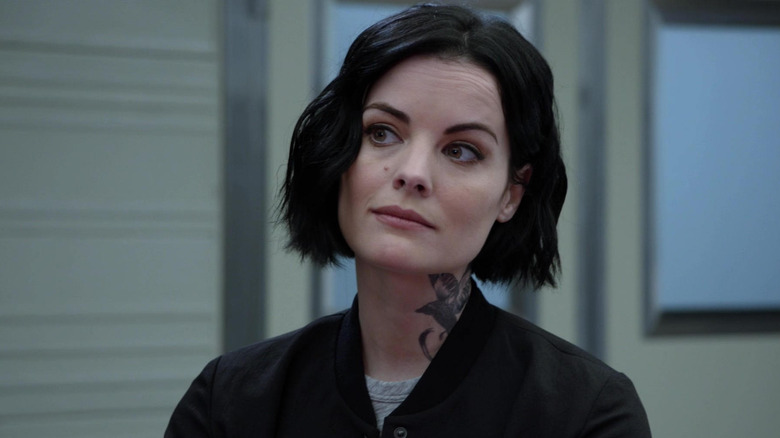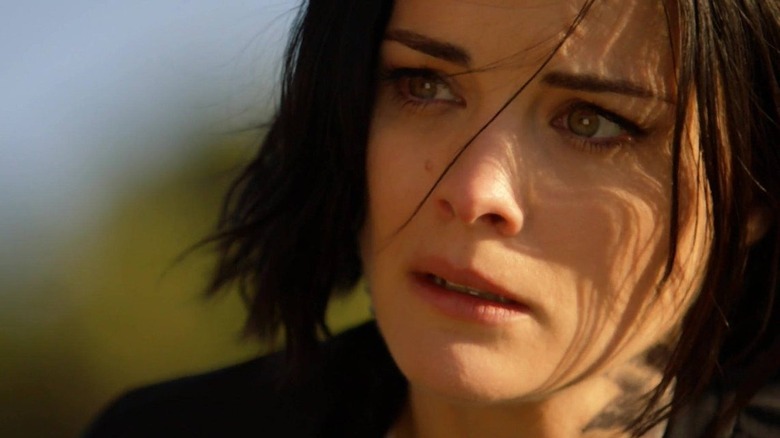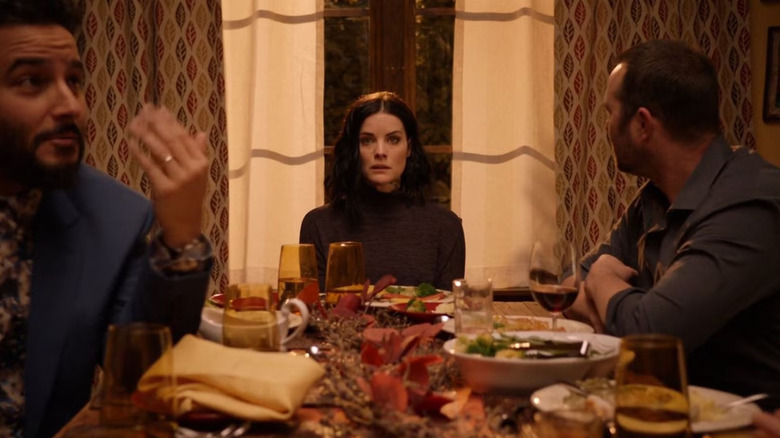Does Jane Die In Blindspot?
Open, ambiguous endings are somewhat of a rarity in movies outside of the realm of science fiction and some horror, but in television, it has become much more common in the past few decades. Maybe it's because "The Sopranos" creator David Chase decided to end the seminal HBO crime series on an infamously unclear note, or maybe it's just because it's much harder to stick the landing when you've been telling a story for tens or hundreds of hours as opposed to two and a half, but TV writers and creators really seem to love endings that leave big questions unanswered. It can be frustrating for some fans who want clear answers, but sometimes it works on shows that already play around with unreliable narrators who skew audience perceptions. An ambiguous ending totally works on something like Damon Lindelof's subversive superhero series "Watchmen" or even Bryan Fuller's twisted crime romance, "Hannibal," but what about a slightly more straightforward action crime show?
Series creator Martin Gero's NBC drama "Blindspot" followed Jane Doe (Jaimie Alexander), a former Navy SEAL and double-agent-turned-terrorist who wakes up one day completely naked, zipped in a bag in Times Square with no memories. The only clues to her past, and clues to solving some pretty major crimes, are her numerous tattoos. That's a pretty great conceit, but when the series finale showed Jane being zipped up in a body bag along with an alternate ending option, it threw some fans for a loop about the fate of their favorite TV amnesiac.
The Blindspot creator intentionally left Jane's ending ambiguous...
On "Blindspot," there is a chemical compound called ZIP meant to be used in low doses to help those who suffer from Post-Traumatic Stress Disorder to erase certain memories, but in larger doses it causes total amnesia, dizziness, nausea, fatigue, hallucinations, and eventually death. When Jane is exposed to ZIP again after having previous interactions with the compound that led to her amnesia, the antidote doesn't work and she has intense hallucinations. It seems like death is only a matter of time, but the hallucinations start helping her solve the crime she's working on, and she delays trying a second round of the antidote until it's too late. We see her both zipped up in a body bag and moving forward in her life after she solves the case, and at the end of a warm and joyous dinner with her friends and family, her husband Kurt (Sullivan Stapleton) points out how lucky they were that she got the antidote just in time, because in another life they might not all be sitting there together otherwise. So is she alive and at the table, or dying and hallucinating her version of a happy ending?
In an interview with TVLine, Gero was asked for a definitive answer on the ending and said the ambiguity was fully intentional:
"I don't think there is a correct interpretation of it. I obviously have my intent, and I and the writers have a strong idea of what we believe. But we wanted it to be a bit of a Rorschach test, and I can't believe how effective it is. Fifty percent of the people [who saw the finale ahead of time] think she's definitely alive, and 50 percent of the people think she's definitely dead. We wanted it to be everything for everybody."
Since she spent most of the episode having wild hallucinations where she spoke to people from throughout her life, it's totally possible that she's either alive or dead, and the ambiguity sells. The only problem is that the finale points pretty heavily toward Jane being dead.
...But Jane is probably dead
Jane's probable death in "Blindspot" isn't quite as complicated as the crash survivor-created afterlife at the end of "Lost," but, understandably, fans weren't entirely sure whether Jane had survived or not when the creator and writers were so keen on keeping it a secret. There are hints in the show that Jane is actually dead; however, like her breaking the fourth wall and staring straight into the camera as flashes of her body in the bag appear when she realizes that her reality might not be all that real at the dinner table (pictured above). That's the final shot in the series, and when Kurt asks her if she's okay and she says "yeah, I'm good," she delivers the line without moving her eyes at all. She knows fully that she's either dying, and this is her brain throwing her a bone by giving her a fake happy ending, or that she's dead and this is her version of heaven, but either way, it's pretty likely that Jane is dead.
Her death isn't meaningless, however, as her decision to delay taking the second round of the antidote is because she's willing to sacrifice herself to catch the baddies. It's an interesting character note that fans can really chew on. While the happy ending might feel more satisfying because she's been through the wringer and deserves a break, her complex death feels a bit more narratively challenging. Maybe they knew fans couldn't handle a more straightforward death, or maybe they felt the mystery of it all was in line with the show's themes all along, but either way, Jane probably kicked it. Sorry.


